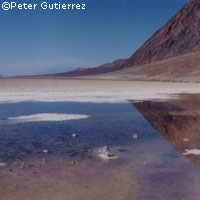Climate report urges mix of mitigation and adaptation policies
The second in a series of four international reports on climate change was released on 6 April, warning that billions of people around the world face food and water shortages and an increased risk of flooding. The report from the Intergovernmental Panel on Climate Change (IPCC) is based on more than 29,000 pieces of data on observed changes to physical and biological aspects of the environment. Scientists on the IPCC believe that 89% of the data are consistent with a warming planet. 'For the first time, we are no longer arm-waving with models; this is empirical data, we can actually measure it,' said co-chair of the IPCC Working Group II, Martin Parry. The report recommends a portfolio of adaptation and mitigation measures to diminish the risks associated with climate change. 'Even the most stringent mitigation efforts cannot avoid further impacts of climate change in the next few decades, which makes adaptation essential, particularly in addressing near-term impacts. [...] This suggests the value of a portfolio or mix of strategies that includes mitigation, adaptation, technological development (to enhance both adaptation and mitigation) and research (on climate science, impacts, adaptation and mitigation,' reads the Summary for Policymakers. The report lists a number of observed changes, along with the degree of certainty that these are being caused by global warming. There is a 'high confidence' that there are now more, and larger glacial lakes, more rock avalanches in mountain regions, and changes in some Arctic and Antarctic ecosystems, affecting predators high in the food chain. There is 'high' confidence that lakes and rivers are getting warmer, which in turn is affecting thermal structure and water quality, and there is high confidence that we are seeing changes to algal, plankton and fish abundance in high-latitude oceans, an increase in algal and zooplankton abundance, and earlier migration by fish in rivers. Certainty over the effects on terrestrial biological systems is even higher. There is 'very high confidence' that spring events such as leaf-unfolding, bird migration and egg-laying are happening earlier, and that there have been poleward and upward shifts in the ranges of plant and animal species. EU Environment Commissioner Stavros Dimas said that the impact and importance of the work carried out by the IPCC could not be overestimated. He pointed out that just a few weeks after Working Group I published its report, the EU's Heads of State and Government committed the EU to an ambitious package of energy and climate change policies and targets. 'The European Union is not waiting for others to take action. Even before negotiations on a global agreement start, the EU leaders have agreed that the EU should make a firm, independent commitment to reduce our emissions by at least 20%,' said Mr Dimas. 'In the current climate discussions, countries are waiting for others to move first. Only EU leadership can break this impasse.' The Commissioner also underlined the role that the EU's Seventh Framework Programme for research (FP7) will play in tackling climate change. He pointed to its significantly increased budget for research on mitigation and adaptation to climate change, as well as for energy and transport technologies. The Commission also intends to have 12 large-scale carbon capture and storage demonstration projects in operation by 2015. The first IPCC report this year, published in February, concluded that it is at least 90% likely that human activities are principally responsible for the warming observed since 1950. The third report, in May, will focus on ways of curbing the rise in greenhouse gas concentrations and temperature, while the fourth report, due in November, will sum up all of the findings.



